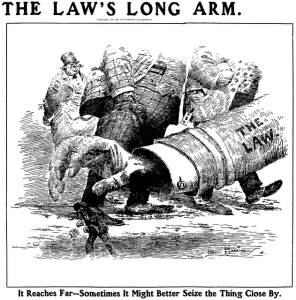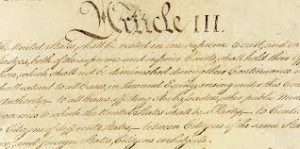 In an uncommon example of a successful application for an appellate stay, the Fifth Circuit stayed the EPA’s rulings about Texas’s haze reduction plans. The Court found a likelihood of success on the merits, based on, inter alia, the degree of deference required by EPA, the lack of on-point authority supporting its position, and statutory limits on its power. As to irreparable injury, the Court noted the substantial compliance costs faced by power companies (to the point of risking
In an uncommon example of a successful application for an appellate stay, the Fifth Circuit stayed the EPA’s rulings about Texas’s haze reduction plans. The Court found a likelihood of success on the merits, based on, inter alia, the degree of deference required by EPA, the lack of on-point authority supporting its position, and statutory limits on its power. As to irreparable injury, the Court noted the substantial compliance costs faced by power companies (to the point of risking  “unemployment and the permanent closure plants”), and the lack of any mechanism for them to recover those costs if the EPA’s rule was invalidated. The Court also noted “the threat of grid instability and potential brownouts,” as well as the potential injury from a violation of the federalism principles in the Clean Air Act. Finally, the court “agree[s] with Petitioners that the public’s interest in ready access to affordable electricity outweighs the inconsequential visibility differences that the federal implementation plan would achieve in the near future.” Texas v. EPA, No. 16-60118 (July 15, 2016).
“unemployment and the permanent closure plants”), and the lack of any mechanism for them to recover those costs if the EPA’s rule was invalidated. The Court also noted “the threat of grid instability and potential brownouts,” as well as the potential injury from a violation of the federalism principles in the Clean Air Act. Finally, the court “agree[s] with Petitioners that the public’s interest in ready access to affordable electricity outweighs the inconsequential visibility differences that the federal implementation plan would achieve in the near future.” Texas v. EPA, No. 16-60118 (July 15, 2016).
 A putative class of New Orleans landowners sought damages arising from the construction of a flood-control canal. The Fifth Circuit affirmed the denial of class certification, noting: “This lawsuit seeks to recover different damages caused by different acts committed by different defendants at different times over a five year period.” Even under Louisiana state law theories that arguably reduced the proof problems, the Court still found fatal problems as to “individual questions regarding causation” (and the exclusion of other potential causes), as well as damages: “Any . . . formula would at a minimum need to take account of the variances in age, size, type, construction, condition, soil composition, and location of the properties.” The Court distinguished other cases that affirmed class certifications as involving “single episodes of tortious conduct usually committed by a single defendant.” Crutchfield v. Sewerage & Water Board, No. 15-30709 (July 13, 2016).
A putative class of New Orleans landowners sought damages arising from the construction of a flood-control canal. The Fifth Circuit affirmed the denial of class certification, noting: “This lawsuit seeks to recover different damages caused by different acts committed by different defendants at different times over a five year period.” Even under Louisiana state law theories that arguably reduced the proof problems, the Court still found fatal problems as to “individual questions regarding causation” (and the exclusion of other potential causes), as well as damages: “Any . . . formula would at a minimum need to take account of the variances in age, size, type, construction, condition, soil composition, and location of the properties.” The Court distinguished other cases that affirmed class certifications as involving “single episodes of tortious conduct usually committed by a single defendant.” Crutchfield v. Sewerage & Water Board, No. 15-30709 (July 13, 2016).
In a fraudulent joinder analysis, the Fifth Circuit observed: “The Mastronardis’ claims against Estrada and Marin are insufficiently pled under either the federal standard or the revised Texas standard, which now tracks the federal standard.” Mastronardi v. Wells Fargo Bank, N.A., No. 15-11028 (June 29, 2016) (citing, inter alia, Tex. R. Civ. P. 91a.1). See also Int’l Energy Ventures v. United Energy Group, No. 14-20552 (March 31, 2016).
 Granados slipped and fell on a puddle in Wal-Mart. The evidence showed that “[p]rior to the slip, a Wal-Mart employee named Mercedes Acosta had been mopping the store’s checkout area. According to video surveillance of the incident, she briefly mopped the entrance of the aisle in which Granados slipped about five minutes prior to the incident, coming within approximately five feet of the puddle’s location with her torso generally facing it. At her deposition, Acosta testified that although she normally looks for puddles and other hazards while cleaning, she did not see the puddle in which Granados slipped when she mopped the aisle. No other witness testified to seeing the puddle. However, an assistant manager at the store who viewed the puddle after Granados slipped testified that someone actively looking for hazards ‘should have noticed the puddle from approximately five feet away if it were present.” Unfortunately for Granados, this evidence did not establish actual knowledge of the puddle, and also did not establish constructive knowledge under Texas law, which emphasizes how long the puddle has been in place (a fact as to which she had no proof). Granados v. Wal-Mart Stores, Inc., No. 15-10837 (June 30, 2016, unpublished).
Granados slipped and fell on a puddle in Wal-Mart. The evidence showed that “[p]rior to the slip, a Wal-Mart employee named Mercedes Acosta had been mopping the store’s checkout area. According to video surveillance of the incident, she briefly mopped the entrance of the aisle in which Granados slipped about five minutes prior to the incident, coming within approximately five feet of the puddle’s location with her torso generally facing it. At her deposition, Acosta testified that although she normally looks for puddles and other hazards while cleaning, she did not see the puddle in which Granados slipped when she mopped the aisle. No other witness testified to seeing the puddle. However, an assistant manager at the store who viewed the puddle after Granados slipped testified that someone actively looking for hazards ‘should have noticed the puddle from approximately five feet away if it were present.” Unfortunately for Granados, this evidence did not establish actual knowledge of the puddle, and also did not establish constructive knowledge under Texas law, which emphasizes how long the puddle has been in place (a fact as to which she had no proof). Granados v. Wal-Mart Stores, Inc., No. 15-10837 (June 30, 2016, unpublished).
 The unsuccessful parties in the arbitration of a real estate dispute challenged confirmation of the award. The Fifth Circuit rejected the argument that the phrase “any other misbehavior by which the rights of any party have been prejudiced in 9 USC § 10(a)(3) could be read as applying to the district court. It also rejected a discovery-related argument when “[t]he arbitrator decided not to issue subpoenas when the Investors failed to answer his questions about what evidence they needed from the two witnesses, who were outside the legal subpoena range, and who were less involved in the relevant transactions than the two Rainier witnesses who testified live at the hearing.” Rainier DSC 1 LLC v. Rainier Capital Management LP, No. 15-20383 (July 7, 2016).
The unsuccessful parties in the arbitration of a real estate dispute challenged confirmation of the award. The Fifth Circuit rejected the argument that the phrase “any other misbehavior by which the rights of any party have been prejudiced in 9 USC § 10(a)(3) could be read as applying to the district court. It also rejected a discovery-related argument when “[t]he arbitrator decided not to issue subpoenas when the Investors failed to answer his questions about what evidence they needed from the two witnesses, who were outside the legal subpoena range, and who were less involved in the relevant transactions than the two Rainier witnesses who testified live at the hearing.” Rainier DSC 1 LLC v. Rainier Capital Management LP, No. 15-20383 (July 7, 2016).
 In the trial of a dispute about the handling of another lawsuit, the plaintiffs’ lawyer in that other suit testified that he would not have settled for less than $3 million. On appeal, two expert reports were cited in opposition to that testimony, and the Fifth Circuit rejected them. It noted that the trial court was within its rights to credit the lawyer’s testimony, and that the reports had been prepared pretrial and thus could not have addressed that testimony. RSUI Indemnity Co. v. American States Ins. Co., No. 15-30976 (July 8, 2016, unpublished).
In the trial of a dispute about the handling of another lawsuit, the plaintiffs’ lawyer in that other suit testified that he would not have settled for less than $3 million. On appeal, two expert reports were cited in opposition to that testimony, and the Fifth Circuit rejected them. It noted that the trial court was within its rights to credit the lawyer’s testimony, and that the reports had been prepared pretrial and thus could not have addressed that testimony. RSUI Indemnity Co. v. American States Ins. Co., No. 15-30976 (July 8, 2016, unpublished).
 Fannie Mae foreclosed on an apartment complex, in part because its management allowed six liens to attach to the property in breach of the loan documents. Self, a guarantor sued for the remaining deficiency, sought discovery about the validity of the liens. The Fifth Circuit agreed with the district court that this request was not a reason for continuance of a ruling on Fannie Mae’s summary judgment motion: “[E]ven if Self could establish that the liens were paid off or expired, such information would not negate his failure to timely secure the release of record of the liens or otherwise timely cure the liens as required under the plain and unambiguous language in the parties’ loan documents.” Fannie Mae v. Self, No. 15-20466 (July 6, 2016, unpublished).
Fannie Mae foreclosed on an apartment complex, in part because its management allowed six liens to attach to the property in breach of the loan documents. Self, a guarantor sued for the remaining deficiency, sought discovery about the validity of the liens. The Fifth Circuit agreed with the district court that this request was not a reason for continuance of a ruling on Fannie Mae’s summary judgment motion: “[E]ven if Self could establish that the liens were paid off or expired, such information would not negate his failure to timely secure the release of record of the liens or otherwise timely cure the liens as required under the plain and unambiguous language in the parties’ loan documents.” Fannie Mae v. Self, No. 15-20466 (July 6, 2016, unpublished).
 The district court required the plaintiff in an FLSA case to submit her phone to a forensic examiner. It then awarded significant sanctions when the defendants’ “inspection revealed that the text messages in question were not on [Plaintiff’s] phone, that the mobile application allegedly containing such text messages was not on the phone, and that the phone appeared to have been reset or newly activated only three days before the forensic inspection.” The Fifth Circuit found no abuse of discretion; footnote 2 of the opinion details several unsuccessful explanations and counterarguments offered by the plaintiff, which had no traction here but could be of interest in a future e-discovery dispute involving similar issues. Timms v. LZM, LLC, No. 15-20700 (July 5, 2016, unpublished).
The district court required the plaintiff in an FLSA case to submit her phone to a forensic examiner. It then awarded significant sanctions when the defendants’ “inspection revealed that the text messages in question were not on [Plaintiff’s] phone, that the mobile application allegedly containing such text messages was not on the phone, and that the phone appeared to have been reset or newly activated only three days before the forensic inspection.” The Fifth Circuit found no abuse of discretion; footnote 2 of the opinion details several unsuccessful explanations and counterarguments offered by the plaintiff, which had no traction here but could be of interest in a future e-discovery dispute involving similar issues. Timms v. LZM, LLC, No. 15-20700 (July 5, 2016, unpublished).
 Bacharach, upset by the handling of credit reporting by SunTrust, sued it under the FCRA. The Fifth Circuit affirmed summary judgment for SunTrust, noting:
Bacharach, upset by the handling of credit reporting by SunTrust, sued it under the FCRA. The Fifth Circuit affirmed summary judgment for SunTrust, noting:
- Reporting about a failed “flip” of commercial property — especially when the alleged losses involved lost rental income — did not fall within the scope of the FCRA;
- Evidence of other, unrelated payment problems during the relevant period negated the element of causation; and
- “Vague and conclusory deposition testimony” does not establish actionable emotional distress under the FCRA.
Bacharah v. Suntrust Mortgage, No. 15-31009 (June 30, 2016).
 Individuals injured in an industrial accident sued DP Engineering; the resulting insurance coverage litigation turned on whether the policies’ “professional services” exclusion applies. As to the duty to defend, after careful review of the underlying pleadings, the Fifth Circuit found that “[t]he facts alleged do not include administrative, non-professional activities,” but rather all involved “injuries that ‘arise out of’ DP Engineering’s . . . allegedly negligent engineering services.” However, the Court found error in resolving the duty to indemnify on the pleadings, as “[t]he allegations in the underlying lawsuits . . . do not conclusively foreclose that facts adduced a trial may show DP Engineering also provided non-professional services, which would be covered under the policy.” Hartford Casualty Ins. Co. v. DP Engineering LLC, No. 15-10443 (June 29, 2016).
Individuals injured in an industrial accident sued DP Engineering; the resulting insurance coverage litigation turned on whether the policies’ “professional services” exclusion applies. As to the duty to defend, after careful review of the underlying pleadings, the Fifth Circuit found that “[t]he facts alleged do not include administrative, non-professional activities,” but rather all involved “injuries that ‘arise out of’ DP Engineering’s . . . allegedly negligent engineering services.” However, the Court found error in resolving the duty to indemnify on the pleadings, as “[t]he allegations in the underlying lawsuits . . . do not conclusively foreclose that facts adduced a trial may show DP Engineering also provided non-professional services, which would be covered under the policy.” Hartford Casualty Ins. Co. v. DP Engineering LLC, No. 15-10443 (June 29, 2016).
 At issue in Meadaa v. Karsan (a case on a return trip to the Fifth Circuit) was whether investors were misled into believing they would acquire an ownership interest in a hotel, or whether the relevant statements were “an unfulfilled future promise.” The Fifth Circuit affirmed a finding that the statements were false and actionable under Louisiana law, noting the combined force of the sellers’ oral representations and followup letters to investors “specifying their individual interests in” the relevant company. No. 15-30413 (May 18, 2016).
At issue in Meadaa v. Karsan (a case on a return trip to the Fifth Circuit) was whether investors were misled into believing they would acquire an ownership interest in a hotel, or whether the relevant statements were “an unfulfilled future promise.” The Fifth Circuit affirmed a finding that the statements were false and actionable under Louisiana law, noting the combined force of the sellers’ oral representations and followup letters to investors “specifying their individual interests in” the relevant company. No. 15-30413 (May 18, 2016).
Celebrate summer with 600 Summer Camp and five good cases to know from the Fifth Circuit in 2016 — and one special bonus!
 In Harris v. Hahn, the Fifth Circuit addressed a challenge to a “residence requirement” – a common feature of public benefit and employment programs, not often challenged in court. This challenge addressed “the constitutionality of the residency requirements in the Hazlewood Act, which provides tuition waivers at public universities for certain Texas veterans who enlisted in Texas or were residents of Texas at the time they enlisted.” The Fifth Circuit found that Texas had rational reasons for the requirement, in that “the prospective benefit advances two interests—education and security—by offering a benefit to residents considering enlistment.” It noted in particular that this benefit was prospective, rather than retroactive; distinguishing it from some other situations that had been more problematic. The Court also found no impermissible restriction on the right to travel, noting that the program affected a relatively small percentage of the population and did not impose a penalty. No. 15-20105 (June 23, 2016).
In Harris v. Hahn, the Fifth Circuit addressed a challenge to a “residence requirement” – a common feature of public benefit and employment programs, not often challenged in court. This challenge addressed “the constitutionality of the residency requirements in the Hazlewood Act, which provides tuition waivers at public universities for certain Texas veterans who enlisted in Texas or were residents of Texas at the time they enlisted.” The Fifth Circuit found that Texas had rational reasons for the requirement, in that “the prospective benefit advances two interests—education and security—by offering a benefit to residents considering enlistment.” It noted in particular that this benefit was prospective, rather than retroactive; distinguishing it from some other situations that had been more problematic. The Court also found no impermissible restriction on the right to travel, noting that the program affected a relatively small percentage of the population and did not impose a penalty. No. 15-20105 (June 23, 2016).
 By short per curiam orders resulting from 4-4 votes, the Supreme Court affirmed the Fifth Circuit’s opinion that upheld an injunction of major parts of President Obama’s immigration program, Texas v. United States, 809 F.3d 134 (5th Cir. 2015), and an important opinion about the jurisdiction of Indian tribal courts, Dolgencorp v. Mississippi Band of Choctaw Indians, 746 F.3d 167 (5th Cir. 2014).
By short per curiam orders resulting from 4-4 votes, the Supreme Court affirmed the Fifth Circuit’s opinion that upheld an injunction of major parts of President Obama’s immigration program, Texas v. United States, 809 F.3d 134 (5th Cir. 2015), and an important opinion about the jurisdiction of Indian tribal courts, Dolgencorp v. Mississippi Band of Choctaw Indians, 746 F.3d 167 (5th Cir. 2014).- These rulings are a “split decision” for Judge Jerry Smith, who wrote for the panel majority in Texas while dissenting in Dolgencorp.
- It is unfortunate that the political process has not produced a ninth Supreme Court Justice, so that the voice of the nation’s highest court could be heard on these important questions of public policy.
 In a 4-3 opinion written by Justice Kennedy, the Supreme Court affirmed the Fifth Circuit’s exhaustive analysis and validation of the admissions policies used by the University of Texas at Austin. Fisher v. University of Texas, No. 14–981 (U.S. June 23, 2016). The Dallas Morning News has an excellent summary of this case’s long history.
In a 4-3 opinion written by Justice Kennedy, the Supreme Court affirmed the Fifth Circuit’s exhaustive analysis and validation of the admissions policies used by the University of Texas at Austin. Fisher v. University of Texas, No. 14–981 (U.S. June 23, 2016). The Dallas Morning News has an excellent summary of this case’s long history.
 Bankruptcy debtors complained that the district court erred erred in overruling their objections to the bankruptcy court’s proposed findings of fact, noting that no responses were filed to those objections. The Fifth Circuit disagreed: “No statute or rule prohibits the district court from considering or ruling on the merits of an unopposed motion just because it is unopposed.” (Of course, “[b]y failing to file objections or respond . . . [the adverse parties] have waived their right to appeal the proposed findings and to present any legal issues in opposition to them,” but “[t]hat waiver . . . has no impact on the district court’s authority to consider the merits of the objection.” Monge v. Rojas, No. 15-50180 (June 14, 2016, unpublished).
Bankruptcy debtors complained that the district court erred erred in overruling their objections to the bankruptcy court’s proposed findings of fact, noting that no responses were filed to those objections. The Fifth Circuit disagreed: “No statute or rule prohibits the district court from considering or ruling on the merits of an unopposed motion just because it is unopposed.” (Of course, “[b]y failing to file objections or respond . . . [the adverse parties] have waived their right to appeal the proposed findings and to present any legal issues in opposition to them,” but “[t]hat waiver . . . has no impact on the district court’s authority to consider the merits of the objection.” Monge v. Rojas, No. 15-50180 (June 14, 2016, unpublished).
 In Wright v. ANR Pipeline, the Fifth Circuit concluded that the plaintiff had not stated a plausible claim against a (nondiverse) employee of a pipeline company, and affirmed the remand of the matter to state court. It changed the disposition of the merits, however, reminding that because the improper joinder “inquiry does not concern the merits, where the court determines that defendant has been improperly joined and should be dismissed, that dismissal must be without prejudice.” No. 15-30741 (June 14, 2016, unpublished).
In Wright v. ANR Pipeline, the Fifth Circuit concluded that the plaintiff had not stated a plausible claim against a (nondiverse) employee of a pipeline company, and affirmed the remand of the matter to state court. It changed the disposition of the merits, however, reminding that because the improper joinder “inquiry does not concern the merits, where the court determines that defendant has been improperly joined and should be dismissed, that dismissal must be without prejudice.” No. 15-30741 (June 14, 2016, unpublished).
 In EEOC v. Bass Pro Outdoor World LLC, the Fifth Circuit addressed a “pattern or practice” suit by the EEOC, which is related to a traditional class action certified under Fed. R. Civ. P. 23, but has additional features by statute. The Court observed several features of the Federal Rules that can reduce the risk of unfair prejudice in such a large-scale case — EEOC or otherwise — including bifurcation, sequenced special interrogatories during the liability phase, and careful attention to the availability of injunctive remedies. No. 15-20078 (
In EEOC v. Bass Pro Outdoor World LLC, the Fifth Circuit addressed a “pattern or practice” suit by the EEOC, which is related to a traditional class action certified under Fed. R. Civ. P. 23, but has additional features by statute. The Court observed several features of the Federal Rules that can reduce the risk of unfair prejudice in such a large-scale case — EEOC or otherwise — including bifurcation, sequenced special interrogatories during the liability phase, and careful attention to the availability of injunctive remedies. No. 15-20078 (
 Continuing a line of cases involving careful scrutiny of injunctions by the Fifth Circuit, the Court again took issue with an order in Scott v. Schedler. The district court required Tom Schedler, Louisiana’s Secretary of State, to “maintain in force and effect his or her policies, procedures, and directives, as revised, relative to the implementation of the [National Voter Registration Act of 1993] with respect [to] coordination of the [Act] within Louisiana.” Schedler objected that the order was not sufficiently specific and the Fifth Circuit agreed: “[T]he injunction refers generally to the defendant’s policies without defining what those policies are or how they can be identified.” Noting that “[w]e are sensitive, of course, to the district court’s difficult position” in drafting a specific injunction without “dictating with intricate precision” state policy, the Court reviewed case law in the area and offered some guidance for remand. No. 15-30652 (June 15, 2016). While arising in the civil rights context, and not involving an effort to hold the Secretary in contempt, this opinion follows naturally from several other recent cases (link above) that have found insufficient specificity to justify sanctions.
Continuing a line of cases involving careful scrutiny of injunctions by the Fifth Circuit, the Court again took issue with an order in Scott v. Schedler. The district court required Tom Schedler, Louisiana’s Secretary of State, to “maintain in force and effect his or her policies, procedures, and directives, as revised, relative to the implementation of the [National Voter Registration Act of 1993] with respect [to] coordination of the [Act] within Louisiana.” Schedler objected that the order was not sufficiently specific and the Fifth Circuit agreed: “[T]he injunction refers generally to the defendant’s policies without defining what those policies are or how they can be identified.” Noting that “[w]e are sensitive, of course, to the district court’s difficult position” in drafting a specific injunction without “dictating with intricate precision” state policy, the Court reviewed case law in the area and offered some guidance for remand. No. 15-30652 (June 15, 2016). While arising in the civil rights context, and not involving an effort to hold the Secretary in contempt, this opinion follows naturally from several other recent cases (link above) that have found insufficient specificity to justify sanctions.
I recently spoke at the University of Texas appellate course to provide an update on recent Fifth Circuit cases, here is my PowerPoint from that presentation.
 Patterson sued Aker Subsea, in the Eastern District of Louisiana, for injuries he suffered while working on a boat off the coast of Russia. He asserted general personal jurisdiction under Fed. R. Civ. P. 4(k)(2) (which measures contacts in federal question cases with reference to the entire U.S., not just a single state), based on several secondment agreements by which Aker assigned its employees to an affiliate in Houston. Relying principally on Bowles v. Ranger Land Systems, 527 F. App’x 319 (5th Cir. 2013), the Fifth Circuit affirmed Aker’s dismissal, noting: “This court has declined to exercise general personal jurisdiction over a corporation where its most significant and continuous contact with the forum was having employees located there.” Patterson v. Aker Solutions Inc., No. 15-30690 (June 13, 2016).
Patterson sued Aker Subsea, in the Eastern District of Louisiana, for injuries he suffered while working on a boat off the coast of Russia. He asserted general personal jurisdiction under Fed. R. Civ. P. 4(k)(2) (which measures contacts in federal question cases with reference to the entire U.S., not just a single state), based on several secondment agreements by which Aker assigned its employees to an affiliate in Houston. Relying principally on Bowles v. Ranger Land Systems, 527 F. App’x 319 (5th Cir. 2013), the Fifth Circuit affirmed Aker’s dismissal, noting: “This court has declined to exercise general personal jurisdiction over a corporation where its most significant and continuous contact with the forum was having employees located there.” Patterson v. Aker Solutions Inc., No. 15-30690 (June 13, 2016).
 Walker, a farmer, received a loan from Guaranty Bank, which acquired a production-money security interest in his crops. Walker then sold the crops to Agrex. Agrex applied a setoff to the sales price, based on problems in other dealings between Walker and Agrex. Guaranty then sued Agrex to recover the entire — pre-setoff — sales price. The Fifth Circuit affirmed judgment for Guaranty, reviewing the applicable UCC section and commentary, under which there is “no requirement that property by ‘received’ . . . for the property qualify as proceeds,” but only “that the property be traceable, directly or indirectly, to the original collateral.” Guaranty Bank & Trust Co. v. Agrex, Inc., No. 15-60445 (revised June 6, 2016).
Walker, a farmer, received a loan from Guaranty Bank, which acquired a production-money security interest in his crops. Walker then sold the crops to Agrex. Agrex applied a setoff to the sales price, based on problems in other dealings between Walker and Agrex. Guaranty then sued Agrex to recover the entire — pre-setoff — sales price. The Fifth Circuit affirmed judgment for Guaranty, reviewing the applicable UCC section and commentary, under which there is “no requirement that property by ‘received’ . . . for the property qualify as proceeds,” but only “that the property be traceable, directly or indirectly, to the original collateral.” Guaranty Bank & Trust Co. v. Agrex, Inc., No. 15-60445 (revised June 6, 2016).
Among other points raised in a challenge to a foreclosure on a Texas home equity loan, the trial court observed: “the curious back dating of the [assignment] confirms the suspicion that this document was generated to obscure the chain of title inquiry rather than to illuminate it.” In reversing the judgment below, on this point the Fifth Circuit held: “At least two Texas Courts of Appeals have considered this very question, and both have held that an assignment may have a retroactive ‘effective date.'” Deutsche Bank v. Burke, No. 15-20201 (June 9, 2016, unpublished).
dating of the [assignment] confirms the suspicion that this document was generated to obscure the chain of title inquiry rather than to illuminate it.” In reversing the judgment below, on this point the Fifth Circuit held: “At least two Texas Courts of Appeals have considered this very question, and both have held that an assignment may have a retroactive ‘effective date.'” Deutsche Bank v. Burke, No. 15-20201 (June 9, 2016, unpublished).
 To acquire rights to use patented check processing technology, Chase paid for a license which contained a “Most Favored Licensee” clause. The licensor granted a similar license to another entity for what Chase contended was a significantly lower royalty. Chase sued and won judgment for roughly $70 million. The Fifth Circuit affirmed, agreeing with Chase’s characterization of the royalty as “paid-up lump sum” rather than “running,” and thus concluding that the MFL clause could apply retroactively and require a refund. A dissent saw the clause as only applying prospectively. The opinions identify a number of practical problems that can arise in drafting sophisticated royalty agreements about intellectual property. JP Morgan Chase Bank NA v. Dixon, No. 15-40905 (May 19, 2016).
To acquire rights to use patented check processing technology, Chase paid for a license which contained a “Most Favored Licensee” clause. The licensor granted a similar license to another entity for what Chase contended was a significantly lower royalty. Chase sued and won judgment for roughly $70 million. The Fifth Circuit affirmed, agreeing with Chase’s characterization of the royalty as “paid-up lump sum” rather than “running,” and thus concluding that the MFL clause could apply retroactively and require a refund. A dissent saw the clause as only applying prospectively. The opinions identify a number of practical problems that can arise in drafting sophisticated royalty agreements about intellectual property. JP Morgan Chase Bank NA v. Dixon, No. 15-40905 (May 19, 2016).
 In a significant and technical dispute about Clean Air Act liability related to emissions at Exxon’s complex in Baytown Texas, the Fifth Circuit touched on a matter of broader interest about restitution/calculation of “benefit.” In its analysis of a proper civil penalty, the Court noted that “the effect of spending money to achieve compliance is often not mitigation of economic benefit — rather, plaintiffs may point to such expenditures as evidence of the regulated entity’s economic benefit to the extent the delay in making those expenditures allowed the regulated entity to use the money it saved productively.” Environment Texas Citizens Lobby v. ExxonMobil Corp., No. 15-20030 (May 27, 2016).
In a significant and technical dispute about Clean Air Act liability related to emissions at Exxon’s complex in Baytown Texas, the Fifth Circuit touched on a matter of broader interest about restitution/calculation of “benefit.” In its analysis of a proper civil penalty, the Court noted that “the effect of spending money to achieve compliance is often not mitigation of economic benefit — rather, plaintiffs may point to such expenditures as evidence of the regulated entity’s economic benefit to the extent the delay in making those expenditures allowed the regulated entity to use the money it saved productively.” Environment Texas Citizens Lobby v. ExxonMobil Corp., No. 15-20030 (May 27, 2016).
 After an investigation by special master Louis Freeh, the district court administering the Deepwater Horizon claims process imposed sanctions on a law firm that had exploited a relationship with a former staff attorney for the program. Among other arguments, the firm argued that the district court could not invoke its inherent power, because the program was not a court proceeding. The Fifth Circuit disagreed, noting that the district court had retained jurisdiction over administration of the program in the order that created it, so its “inherent authority to police seroius misconduct before it extended to the [program] over which it retained continuing and exclusive jurisdiction.” The Court distinguished Positive Software Solutions v. New Century Mortgage Corp., 619 F.3d 458 (5th Cir. 2010), which reversed a sanctions award about an arbitration, and FDIC v. Maxxam, Inc., 523 F.3d 566 (5th Cir. 2008), which involved “a proceeding that was not before the district court and did not challenge [its] authority.” In re Deepwater Horizon, No. 15-30265 (June 2, 2016).
After an investigation by special master Louis Freeh, the district court administering the Deepwater Horizon claims process imposed sanctions on a law firm that had exploited a relationship with a former staff attorney for the program. Among other arguments, the firm argued that the district court could not invoke its inherent power, because the program was not a court proceeding. The Fifth Circuit disagreed, noting that the district court had retained jurisdiction over administration of the program in the order that created it, so its “inherent authority to police seroius misconduct before it extended to the [program] over which it retained continuing and exclusive jurisdiction.” The Court distinguished Positive Software Solutions v. New Century Mortgage Corp., 619 F.3d 458 (5th Cir. 2010), which reversed a sanctions award about an arbitration, and FDIC v. Maxxam, Inc., 523 F.3d 566 (5th Cir. 2008), which involved “a proceeding that was not before the district court and did not challenge [its] authority.” In re Deepwater Horizon, No. 15-30265 (June 2, 2016).
 The Fifth Circuit reversed an ALJ ruling in a labor dispute in DirecTV Holdings v. NLRB. The panel majority, noting that “the NLRB makes much of the fact that [the employee’s] initial suspension was transformed into a termination,” gave no weight to “unsupported speculation” as to why that change occurred. The dissent noted the timing of relevant events around the date of that decision, and gave weight to the ALJ’s credibility determinations as to the relevant witness. This exchange is a classic illustration of how reasonable minds can differ as to when an “inference” becomes impermissible “speculation.” No. 15-60257 (May 31, 2016, unpublished).
The Fifth Circuit reversed an ALJ ruling in a labor dispute in DirecTV Holdings v. NLRB. The panel majority, noting that “the NLRB makes much of the fact that [the employee’s] initial suspension was transformed into a termination,” gave no weight to “unsupported speculation” as to why that change occurred. The dissent noted the timing of relevant events around the date of that decision, and gave weight to the ALJ’s credibility determinations as to the relevant witness. This exchange is a classic illustration of how reasonable minds can differ as to when an “inference” becomes impermissible “speculation.” No. 15-60257 (May 31, 2016, unpublished).
 In Wills v. Arizon Structures, the parties disputed whether a Missouri judgment about arbitrability precluded a later motion to compel arbitration. The petitioners had been involved in the Missouri proceedings but obtained dismissal for lack of personal jurisdiction. The Fifth Circuit found that the judgment entered in Missouri against the business that employed them did not create a collateral estoppel bar. Privity, for purposes of claim or issue preclusion, does not ordinarily arise “based solely on an employment or corporate relationship.” And “[a] shared interest in compelling arbitration, by itself, does not warrant the conclusion that the parties are in privity such that the judgment denying [Employer’s] motion to compel arbitration binds Employees.” No. 15-41166 (May 27, 2016).
In Wills v. Arizon Structures, the parties disputed whether a Missouri judgment about arbitrability precluded a later motion to compel arbitration. The petitioners had been involved in the Missouri proceedings but obtained dismissal for lack of personal jurisdiction. The Fifth Circuit found that the judgment entered in Missouri against the business that employed them did not create a collateral estoppel bar. Privity, for purposes of claim or issue preclusion, does not ordinarily arise “based solely on an employment or corporate relationship.” And “[a] shared interest in compelling arbitration, by itself, does not warrant the conclusion that the parties are in privity such that the judgment denying [Employer’s] motion to compel arbitration binds Employees.” No. 15-41166 (May 27, 2016).
I recently published an article, titled “Convergence of Federal Rules 8(A) and 9(B) – The Fifth Circuit’s Application of Twombly and Iqbal” in the Southern University Law Review.
 After Hall Street Associates LLC v. Mattel, Inc., 552 U.S. 576 (2008), the Fifth Circuit concluded that “manifest disregard of the law” was no longer available as a nonstatutory ground for vacatur of an arbitration award under the FAA. Since then, other circuits have considered whether “manifest disregard” can be a statutory basis for vacatur. In McKool Smith PC v. Curtis Int’l, the losing party in an attorneys fee dispute
After Hall Street Associates LLC v. Mattel, Inc., 552 U.S. 576 (2008), the Fifth Circuit concluded that “manifest disregard of the law” was no longer available as a nonstatutory ground for vacatur of an arbitration award under the FAA. Since then, other circuits have considered whether “manifest disregard” can be a statutory basis for vacatur. In McKool Smith PC v. Curtis Int’l, the losing party in an attorneys fee dispute  mounted such a challenge to the arbitrator’s award in favor of the firm, but the Court sidestepped the issue, finding support for the arbitrator’s rulings in the applicable Texas case law. No. 15-11140 (May 23, 2016, unpublished) (Almost simultaneously, the Texas Supreme Court rejected the “statutory basis” argument in Hoskins v. Hoskins, No. 15-0046 (May 20, 2016)).
mounted such a challenge to the arbitrator’s award in favor of the firm, but the Court sidestepped the issue, finding support for the arbitrator’s rulings in the applicable Texas case law. No. 15-11140 (May 23, 2016, unpublished) (Almost simultaneously, the Texas Supreme Court rejected the “statutory basis” argument in Hoskins v. Hoskins, No. 15-0046 (May 20, 2016)).
 Ronald Crose, an overly enthusiastic raver, took ecstasy and suffered a stroke not long after. A suit on his health insurance policy followed; at issue was an exclusion for “[l]oss due to being . . . under the influence of any narcotic.” The Fifth Circuit agreed that ecstasy was a “narcotic” within the meaning of the exclusion, rejecting as overly technical the argument that “narcotic” refers only to “drugs derived from a plant” (as opposed to a “hallucinogen” such as ectasy). The Court went on to find that under applicable Texas law, “due to” required more than “but for” causation, but did not require proof that the narcotic was the sole cause of injury. Crose v. Humana Ins. Co., No. 15-50559 (May 23, 2016).
Ronald Crose, an overly enthusiastic raver, took ecstasy and suffered a stroke not long after. A suit on his health insurance policy followed; at issue was an exclusion for “[l]oss due to being . . . under the influence of any narcotic.” The Fifth Circuit agreed that ecstasy was a “narcotic” within the meaning of the exclusion, rejecting as overly technical the argument that “narcotic” refers only to “drugs derived from a plant” (as opposed to a “hallucinogen” such as ectasy). The Court went on to find that under applicable Texas law, “due to” required more than “but for” causation, but did not require proof that the narcotic was the sole cause of injury. Crose v. Humana Ins. Co., No. 15-50559 (May 23, 2016).
 Building on Wooten v. McDonald Transit Associates, Inc., 788 F.3d 490 (5th Cir. 2015), the Fifth Circuit found that a pro se plaintiff had adequately pleaded an ADEA claim in Haskett v. T.S. Dudley Land Co., No. 14-41459 (May 20, 2016, unpublished). Haskett attached his employer’s response to his EEOC charge as an exhibit to his complaint, and the employer argued that the statements in that response negated Haskett’s claim. The Court disagreed: “Haskett clearly did not adopt [his employer’s] allegations to the EEOC as his own for purposes of his complaint. They are therefore still ‘unilateral’ and to the extent they are in tension with the complaint itself, they cannot control.” (citing Bosarge v. Mississippi Bureau of Narcotics, 796 F.3d 435, 440 (5th Cir. 2015)).
Building on Wooten v. McDonald Transit Associates, Inc., 788 F.3d 490 (5th Cir. 2015), the Fifth Circuit found that a pro se plaintiff had adequately pleaded an ADEA claim in Haskett v. T.S. Dudley Land Co., No. 14-41459 (May 20, 2016, unpublished). Haskett attached his employer’s response to his EEOC charge as an exhibit to his complaint, and the employer argued that the statements in that response negated Haskett’s claim. The Court disagreed: “Haskett clearly did not adopt [his employer’s] allegations to the EEOC as his own for purposes of his complaint. They are therefore still ‘unilateral’ and to the extent they are in tension with the complaint itself, they cannot control.” (citing Bosarge v. Mississippi Bureau of Narcotics, 796 F.3d 435, 440 (5th Cir. 2015)).
 Presenting a textbook Erie problem, Passmore sued Baylor Regional Medical Center about his back surgeries in federal court based on bankruptcy jurisdiction. The defendants obtained dismissal on the expert report requirements in section 74.351 of the Texas Civil Practice & Remedies Code. Reviewing the requirements of that statute, the requirements of the Federal Rules of Civil Procedure governing discovery, and district court opinions on the matter, the Fifth Circuit reversed, holding: “Section 74.351’s regulation of discovery and discovery-related sanctions sets it apart from the pre-suit requirements in the cases cited by the defendants and brings it into direct collision with Rules 26 and 37.” Passmore v. Baylor Health Care System, No. 15-10358 (May 19, 2016).
Presenting a textbook Erie problem, Passmore sued Baylor Regional Medical Center about his back surgeries in federal court based on bankruptcy jurisdiction. The defendants obtained dismissal on the expert report requirements in section 74.351 of the Texas Civil Practice & Remedies Code. Reviewing the requirements of that statute, the requirements of the Federal Rules of Civil Procedure governing discovery, and district court opinions on the matter, the Fifth Circuit reversed, holding: “Section 74.351’s regulation of discovery and discovery-related sanctions sets it apart from the pre-suit requirements in the cases cited by the defendants and brings it into direct collision with Rules 26 and 37.” Passmore v. Baylor Health Care System, No. 15-10358 (May 19, 2016).
 Hazim, a resident of Kansas, sued S&D Ltd., a publisher based in the UK, about its handling of Hazim’s book. Their contract had Texas choice-of-law and forum-selection provisions. Finding that the specific terms of the forum selection provision were not dispositive, the Fifth Circuit held that under Int’l Energy Ventures Management LLC v. United Energy Group, 2016 WL 1274030 (5th Cir. March 31, 2016), Hazim did not establish personal jurisdiction: “[T]he contract was between a Kansas resident and a United Kingdom entity and contemplated performance in the United Kingdom and Kansas. Even accepting that the contract contained the Texas choice-of-law and forum selection provision (as the IVEM-UEG contract did) . . . the contract on which Hazim is suing is not sufficiently related to Texas[.]” Hazim v. Schile & Denver Book Publishers, No. 15-20586 (May 5, 2016, unpublished).
Hazim, a resident of Kansas, sued S&D Ltd., a publisher based in the UK, about its handling of Hazim’s book. Their contract had Texas choice-of-law and forum-selection provisions. Finding that the specific terms of the forum selection provision were not dispositive, the Fifth Circuit held that under Int’l Energy Ventures Management LLC v. United Energy Group, 2016 WL 1274030 (5th Cir. March 31, 2016), Hazim did not establish personal jurisdiction: “[T]he contract was between a Kansas resident and a United Kingdom entity and contemplated performance in the United Kingdom and Kansas. Even accepting that the contract contained the Texas choice-of-law and forum selection provision (as the IVEM-UEG contract did) . . . the contract on which Hazim is suing is not sufficiently related to Texas[.]” Hazim v. Schile & Denver Book Publishers, No. 15-20586 (May 5, 2016, unpublished).
 Carlson alleged injuries from the ProNeuroLight, an infrared therapy device. At trial, the defendants called a chiropractor with some experience using the device. The Fifth Circuit expressed skepticism about his qualifications, noting: “While he does make diagnoses and orders tests as part of his chiropractic and alternative medicine practice, [his] qualifications do not align with or support his challenged medical causation testimony.” The Court did not rule on that basis, however, instead finding that “a district court must . . . perform its gatekeeping function by performing some type of Daubert inquiry and by making findings about the witness’s qualifications to give expert testimony.” Here, admitting the chiropractor’s testimony without taking those steps was an abuse of discretion. The Court found harm, noting that he was the sole defense witness, that his testimony was cited in closing, and that the defendants won. Accordingly, it reversed and remanded. Carlson v. Bioremedic Therapeutic Systems, Inc., No. 14-20691 (May 16, 2016).
Carlson alleged injuries from the ProNeuroLight, an infrared therapy device. At trial, the defendants called a chiropractor with some experience using the device. The Fifth Circuit expressed skepticism about his qualifications, noting: “While he does make diagnoses and orders tests as part of his chiropractic and alternative medicine practice, [his] qualifications do not align with or support his challenged medical causation testimony.” The Court did not rule on that basis, however, instead finding that “a district court must . . . perform its gatekeeping function by performing some type of Daubert inquiry and by making findings about the witness’s qualifications to give expert testimony.” Here, admitting the chiropractor’s testimony without taking those steps was an abuse of discretion. The Court found harm, noting that he was the sole defense witness, that his testimony was cited in closing, and that the defendants won. Accordingly, it reversed and remanded. Carlson v. Bioremedic Therapeutic Systems, Inc., No. 14-20691 (May 16, 2016).
 Unsuccessfully, Plaintiff sued about the foreclosure on his home in state court in 2008, and again in federal court in 2012. The Fifth Circuit said he was “WARNED that further frivolous litigation will result in substantial sanctions under Rule 38 or this court’s inherent sanctioning power and will include monetary sanctions and restrictions on access to federal court.” Then, he filed a 60(b) motion, which he also lost, and which he also appealed. The Court dismissed his appeal as frivolous, sanctioned him $500, and barred him from future litigation about the foreclosure without leave of court. Fantroy v. First Financial Bank, No. 15-10975 (May 13, 2016, unpublished). (Some time ago, I
Unsuccessfully, Plaintiff sued about the foreclosure on his home in state court in 2008, and again in federal court in 2012. The Fifth Circuit said he was “WARNED that further frivolous litigation will result in substantial sanctions under Rule 38 or this court’s inherent sanctioning power and will include monetary sanctions and restrictions on access to federal court.” Then, he filed a 60(b) motion, which he also lost, and which he also appealed. The Court dismissed his appeal as frivolous, sanctioned him $500, and barred him from future litigation about the foreclosure without leave of court. Fantroy v. First Financial Bank, No. 15-10975 (May 13, 2016, unpublished). (Some time ago, I  wrote an article called “Loud Rules” with Wendy Couture about the nuances of this kind of judicial warning.)
wrote an article called “Loud Rules” with Wendy Couture about the nuances of this kind of judicial warning.)
 The district court granted the plaintiff’s motion for conditional class certification under the Fair Labor Standards Act. The defendant sought mandamus review, and the Fifth Circuit held the petition in abatement for more information: ” Although there is generally no ‘inflexible rule requiring district courts to file a written order explaining their decisions,” in this case the district court’s ‘lack of explanation makes it impossible for us to determine’ whether mandamus relief would be appropriate here.” In re Schlumberger Tech. Corp., No. 16-20267 (May 13, 2016, unpublished).
The district court granted the plaintiff’s motion for conditional class certification under the Fair Labor Standards Act. The defendant sought mandamus review, and the Fifth Circuit held the petition in abatement for more information: ” Although there is generally no ‘inflexible rule requiring district courts to file a written order explaining their decisions,” in this case the district court’s ‘lack of explanation makes it impossible for us to determine’ whether mandamus relief would be appropriate here.” In re Schlumberger Tech. Corp., No. 16-20267 (May 13, 2016, unpublished).
 In Carpenter Properties Inc. v. JP Morgan Chase Bank, the Fifth Circuit found that a contract had been modified notwithstanding a signature on a formal counteroffer, but then found no liability under a “corporate veil” theory as to Chase: “[M]ere frustration with Chase for its failure to pay a commission once Chase’s identity was known is insufficient to amount to frustration of contractual expectations regarding the party to whom Carpenter looked for performance . . . .” No. 15-60309 (May 4, 2016, unpublished).
In Carpenter Properties Inc. v. JP Morgan Chase Bank, the Fifth Circuit found that a contract had been modified notwithstanding a signature on a formal counteroffer, but then found no liability under a “corporate veil” theory as to Chase: “[M]ere frustration with Chase for its failure to pay a commission once Chase’s identity was known is insufficient to amount to frustration of contractual expectations regarding the party to whom Carpenter looked for performance . . . .” No. 15-60309 (May 4, 2016, unpublished).
 The plaintiff in Watson v. City of Allen sued, in Texas state court, several Texas cities about the operation of their “red light camera” programs.No. 15-10732 (May 5, 2016). The cities removed based on his RICO claim and CAFA. Plaintiff then dropped the RICO claim and sought remand based on CAFA’s “local controversy” and “home state” exceptions. The district court kept the case, finding it untimely as to CAFA, finding supplemental jurisdiction over the remaining state-law claims, and dismissing many claims for lack of standing. The Fifth Circuit reversed, concluding:
The plaintiff in Watson v. City of Allen sued, in Texas state court, several Texas cities about the operation of their “red light camera” programs.No. 15-10732 (May 5, 2016). The cities removed based on his RICO claim and CAFA. Plaintiff then dropped the RICO claim and sought remand based on CAFA’s “local controversy” and “home state” exceptions. The district court kept the case, finding it untimely as to CAFA, finding supplemental jurisdiction over the remaining state-law claims, and dismissing many claims for lack of standing. The Fifth Circuit reversed, concluding:
- The 30-day deadline in 28 U.S.C. § 1447(c) does not apply to CAFA mandatory abstention provisions, since it “does not deprive federal courts of subject matter jurisdiction, but rather, acts as a limitation upon the exercise of jurisdiction granted by CAFA.”
- The CAFA motion was filed within a reasonable time of removal, when “[a]ll indications are that [Plaintiff] acted diligently to gather evidence,” and because “fifty-two days is simply not a very long time.”
 The “home state” exception applied because “[t]his suit’s primary thrust is an attempt to declare unconstitutional red light camera scheme,” meaning that the State of Texas and its municipalities were the “primary defendants,” and not the companies hired to carry out the program.
The “home state” exception applied because “[t]his suit’s primary thrust is an attempt to declare unconstitutional red light camera scheme,” meaning that the State of Texas and its municipalities were the “primary defendants,” and not the companies hired to carry out the program.- The district court should have declined to exercise supplemental jurisdiction, since “Texas courts have a strong interest” in the remaining issues and the plaintiff’s “motion to amend . . . to delete the federal claims is not a particularly egregious form of forum manipulation, if it is manipulation at all.”
The case of In re Mole involved continuing fallout from proceedings involving impeached judge Thomas Porteous. Mole was accused of hiring an attorney who “had no useful experience in the type of litigation” at hand in an attempt to have Judge Porteous recuse himself. In disciplinary proceedings before the Eastern District of Louisiana, the first judge to hear the matter declined to sanction Mole, but the full court – reviewing the same record – suspended him for a year. The Fifth Circuit found that the en banc Eastern District could rule differently from the initial judge without giving it deference, and that sufficient evidence supported the sanction — in particular, “the $100,000 severance fee in the retention letter incentivizes the prospect of a recusal.” No. 15-30647 (May 4, 2016).
 Baker sued DeShong under the Lanham Act about use of the phrase “HIV Innocence Group,” in connection with advocacy programs for individuals accused of infecting others with HIV. DeShong won and sought an award of attorneys fees. The Fifth Circuit concluded that after Octane Fitness v. Icon Health & Fitness, 134 S. Ct. 1749 (2014) (a patent case, but analogous to the similar Lanham Act provision), an award of fees to a defendant was not limited to bad faith and did not require a “clear and convincing” showing. To qualify as an “exceptional” case that justifies a fee award, the court should consider a “nonexclusive’ list of ‘factors,’ including ‘frivolousness, motivation, objective unreasonableness (both in the factual and legal components of the case) and the need in particular circumstances to advance considerations of compensation and deterrence.” Baker v. DeShong, No. 14-11157 (May 3, 2016).
Baker sued DeShong under the Lanham Act about use of the phrase “HIV Innocence Group,” in connection with advocacy programs for individuals accused of infecting others with HIV. DeShong won and sought an award of attorneys fees. The Fifth Circuit concluded that after Octane Fitness v. Icon Health & Fitness, 134 S. Ct. 1749 (2014) (a patent case, but analogous to the similar Lanham Act provision), an award of fees to a defendant was not limited to bad faith and did not require a “clear and convincing” showing. To qualify as an “exceptional” case that justifies a fee award, the court should consider a “nonexclusive’ list of ‘factors,’ including ‘frivolousness, motivation, objective unreasonableness (both in the factual and legal components of the case) and the need in particular circumstances to advance considerations of compensation and deterrence.” Baker v. DeShong, No. 14-11157 (May 3, 2016).
 Dickson guaranteed a large debt owed by Community Home Financial Services. Community went into bankruptcy, disputing the extent and validity of its obligations to its lenders. Unfortunately for Dickson, his guaranty not only waived all defenses to enforcement, and stated that it created an obligation independent of Community’s, but also said it was not changed “by the partial or complete unenforceability or invalidity” of the guaranteed obligation. He also disputed the amount owing, but the Fifth Circuit agreed that the affidavit evidence he submitted “contained only another set of allegations” and did not preclude summary judgment against him. Edwards Family Partnership LP v. Dickson, No. 15-60683 (April 29, 2016).
Dickson guaranteed a large debt owed by Community Home Financial Services. Community went into bankruptcy, disputing the extent and validity of its obligations to its lenders. Unfortunately for Dickson, his guaranty not only waived all defenses to enforcement, and stated that it created an obligation independent of Community’s, but also said it was not changed “by the partial or complete unenforceability or invalidity” of the guaranteed obligation. He also disputed the amount owing, but the Fifth Circuit agreed that the affidavit evidence he submitted “contained only another set of allegations” and did not preclude summary judgment against him. Edwards Family Partnership LP v. Dickson, No. 15-60683 (April 29, 2016).
 Billings v. Propel Financial Services, LLC involved plaintiffs, making claims under the Truth in Lending Act, arising from property tax loans they obtained in exchange for the transfer of their tax liens pursuant to the Texas Tax Code. Applying prior precedent in a an analogous bankruptcy context, the Fifth Circuit held: “[I]t is clear that the payments made by defendants to the relevant taxing authorities and the subsequent transfer of the tax liens and execution of the promissory notes did not extinguish the original tax obligations, but rather, simply transferred the preexisting tax obligations to new entities. Thus, the transfers and promissory notes did not create new debts that would be subject to TILA, but rather transferred existing tax obligations, which are not ‘debts’ subject to TILA.” No. 14-51326-CV (April 29, 2016).
Billings v. Propel Financial Services, LLC involved plaintiffs, making claims under the Truth in Lending Act, arising from property tax loans they obtained in exchange for the transfer of their tax liens pursuant to the Texas Tax Code. Applying prior precedent in a an analogous bankruptcy context, the Fifth Circuit held: “[I]t is clear that the payments made by defendants to the relevant taxing authorities and the subsequent transfer of the tax liens and execution of the promissory notes did not extinguish the original tax obligations, but rather, simply transferred the preexisting tax obligations to new entities. Thus, the transfers and promissory notes did not create new debts that would be subject to TILA, but rather transferred existing tax obligations, which are not ‘debts’ subject to TILA.” No. 14-51326-CV (April 29, 2016).
 In a significant contribution to the Fifth Circuit’s case law applying Twombly and Iqbal, the Court reversed the Rule 12 dismissal of a products liability case in Flagg v. Stryker Corp., recognizing that “in products liability lawsuits, almost all of the evidence is in the possession of the defendant.” The defendants, manufacturers of toe implants, contended that Flagg’s allegations “lack . . .details about how the implants may have deviated from specifications and performance standards” and did not “sufficiently allege an existing and non-burdensome alternative design.” The Court found sufficient detail, for the pleading stage, in Flagg’s allegations that “the shape and sizing of the implants led to the implants’ fracturing and caused them to be difficult to remove once broken,” as well as his allegation that a different alloy would have performed better. It concluded: “Perhaps after discovery Flagg will not prevail, but at a pre-discovery stage of this case, in an area of law where defendants are likely to exclusively possess the information relevant to making more detailed factual allegations, we cannot say that he is merely on a fishing expedition.” No. 14-31169 (April 26, 2016, unpublished).
In a significant contribution to the Fifth Circuit’s case law applying Twombly and Iqbal, the Court reversed the Rule 12 dismissal of a products liability case in Flagg v. Stryker Corp., recognizing that “in products liability lawsuits, almost all of the evidence is in the possession of the defendant.” The defendants, manufacturers of toe implants, contended that Flagg’s allegations “lack . . .details about how the implants may have deviated from specifications and performance standards” and did not “sufficiently allege an existing and non-burdensome alternative design.” The Court found sufficient detail, for the pleading stage, in Flagg’s allegations that “the shape and sizing of the implants led to the implants’ fracturing and caused them to be difficult to remove once broken,” as well as his allegation that a different alloy would have performed better. It concluded: “Perhaps after discovery Flagg will not prevail, but at a pre-discovery stage of this case, in an area of law where defendants are likely to exclusively possess the information relevant to making more detailed factual allegations, we cannot say that he is merely on a fishing expedition.” No. 14-31169 (April 26, 2016, unpublished).
 At issue in Hefren v. McDermott, Inc. was whether the Front Runner Spar (right) – a type of offshore drilling platform with a remarkable resemblance to a Jawan Sandcrawler – was “immovable” within the meaning of Louisiana law. A dispositive issue of limitations turned on that classification. Noting that the Spar could be moved with sufficient planning and preparation, the Fifth Circuit agreed with the district court that: “Like a ‘building’ under Louisiana law, there is ‘some permanence’ to the Front Runner Spar as it has not moved from its present location, is intended to remain there for its twenty year life, and has a permanent mooring system.” No. 15-30980 (April 25, 2016, unpublished).
At issue in Hefren v. McDermott, Inc. was whether the Front Runner Spar (right) – a type of offshore drilling platform with a remarkable resemblance to a Jawan Sandcrawler – was “immovable” within the meaning of Louisiana law. A dispositive issue of limitations turned on that classification. Noting that the Spar could be moved with sufficient planning and preparation, the Fifth Circuit agreed with the district court that: “Like a ‘building’ under Louisiana law, there is ‘some permanence’ to the Front Runner Spar as it has not moved from its present location, is intended to remain there for its twenty year life, and has a permanent mooring system.” No. 15-30980 (April 25, 2016, unpublished).
Last Friday, I spoke about recent federal cases on sanctions and professional responsibility issues; for some ethics CLE self-study, here is the handout that I used.
 The Texas Package Sales Association, a trade association of alcohol sellers, moved for relief under Fed. R. Civ. P. 60(b) from a longstanding injunction against the enforcement of a residency requirement for sales permits. The Fifth Circuit concluded:
The Texas Package Sales Association, a trade association of alcohol sellers, moved for relief under Fed. R. Civ. P. 60(b) from a longstanding injunction against the enforcement of a residency requirement for sales permits. The Fifth Circuit concluded:
- While not a plaintiff in the original litigation, TPSA had intervened in it, and could challenge the permanent injunction; and
- TPSA had standing as an organization to sue about the requirement; but
- Subsequent Supreme Court opinions about the Commerce Clause did not create an intervening change in the law that would justify Rule 60(b) relief original litigation; and
- TPSA had not adequately placed at issue the alternative ground for the injunction, based on the Privileges and Immunities Clause.
A dissent would not have found that TPSA had standing to sue, characterizing its suit as an effort “to substitute itself . . for the state authorities” with jurisdiction over the applicable law. Cooper v. TABC, No. 14-51343 (April 21, 2016).
 A magistrate judge ordered remand to state court in Davidson v. Georgia-Pacific. The Fifth Circuit concluded that because “a remand order is dispositive insofar as proceedings in the federal court are concerned,” it is “the functional equivalent of an order of dismissal.” Therefore, a magistrate judge could not make a final ruling on a motion to remand. In so holding, the Court “join[s] the uniform view of the courts of appeals that have considered this question[.]” No. 14-30925 (April 19, 2016).
A magistrate judge ordered remand to state court in Davidson v. Georgia-Pacific. The Fifth Circuit concluded that because “a remand order is dispositive insofar as proceedings in the federal court are concerned,” it is “the functional equivalent of an order of dismissal.” Therefore, a magistrate judge could not make a final ruling on a motion to remand. In so holding, the Court “join[s] the uniform view of the courts of appeals that have considered this question[.]” No. 14-30925 (April 19, 2016).
 Appellants, investors who lost money in their dealings with Allen Stanford, began a FINRA arbitration against Pershing LLC, a clearing broker. The panel rejected appellants’ $80 million claim, awarding only $10,000 in arbitration-related expenses. Pershing sought confirmation in federal court and encountered a split in authority about the amount-in-controversy requirement — the “demand” approach, which would allow jurisdiction, and the “award” approach, which would not. The Fifth Circuit sided with the “demand” approach, finding that it “recognizes the true scope of the controversy between the parties,” and was consistent with the corresponding test for claims filed in district court. A lengthy concurrence suggested that a “general approach” was not needed, given the different fact patterns that can give rise to this kind of dispute about the amount in controversy. Pershing LLC v. Kiebach, No. 15-30396 (April 6, 2016).
Appellants, investors who lost money in their dealings with Allen Stanford, began a FINRA arbitration against Pershing LLC, a clearing broker. The panel rejected appellants’ $80 million claim, awarding only $10,000 in arbitration-related expenses. Pershing sought confirmation in federal court and encountered a split in authority about the amount-in-controversy requirement — the “demand” approach, which would allow jurisdiction, and the “award” approach, which would not. The Fifth Circuit sided with the “demand” approach, finding that it “recognizes the true scope of the controversy between the parties,” and was consistent with the corresponding test for claims filed in district court. A lengthy concurrence suggested that a “general approach” was not needed, given the different fact patterns that can give rise to this kind of dispute about the amount in controversy. Pershing LLC v. Kiebach, No. 15-30396 (April 6, 2016).
 In July 2009, hail damaged the then-dormant Dallas Plaza Hotel (right), owned by Hamilton Properties. Hamilton inspected the property in November 2010, emailed an insurance agent in February 2011, and filed a claim in October 2011. The Fifth Circuit agreed that Hamilton had failed to give reasonably prompt notice, noting that it had no explanation for the long delay, and that while the insurer had been able to investigate the claim: “It is undisputed that because of Hamilton’s delay, AIC lost access to critical evidence, including the condition of the twelfth floor before and after the July hailstorm and up until the end of the coverage period.” Hamilton Properties, Inc v. American Ins. Co., No. 15-10382 (April 14, 2016, unpublished).
In July 2009, hail damaged the then-dormant Dallas Plaza Hotel (right), owned by Hamilton Properties. Hamilton inspected the property in November 2010, emailed an insurance agent in February 2011, and filed a claim in October 2011. The Fifth Circuit agreed that Hamilton had failed to give reasonably prompt notice, noting that it had no explanation for the long delay, and that while the insurer had been able to investigate the claim: “It is undisputed that because of Hamilton’s delay, AIC lost access to critical evidence, including the condition of the twelfth floor before and after the July hailstorm and up until the end of the coverage period.” Hamilton Properties, Inc v. American Ins. Co., No. 15-10382 (April 14, 2016, unpublished).
